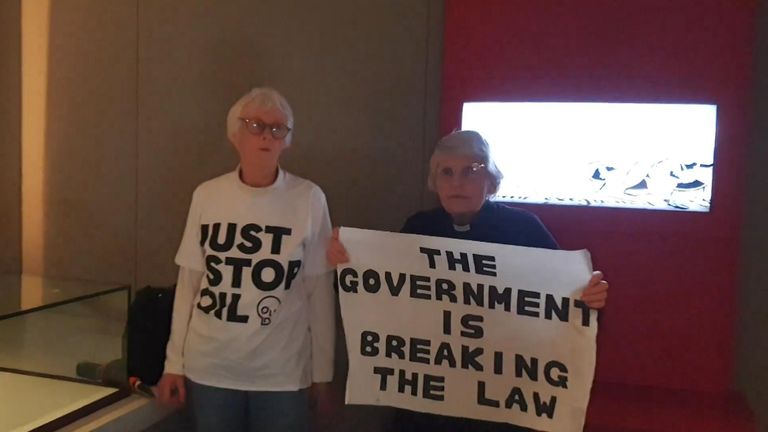Extending police powers over protests unlawful, High Court rules
Campaigners have hailed a "victory for democracy" after judges said the Home Office's attempt to lower the threshold for a "serious disruption" was unlawful.
Tuesday 21 May 2024 15:37, UK
The government's attempt to lower the threshold for police intervening in protests was unlawful, the High Court has ruled.
Campaign group Liberty brought legal action against the Home Office over protest regulations passed by statutory instrument last year.
Politics Live:
Sunak promises to 'move as quickly as possible'
The measures lowered the bar for what is considered "serious disruption" to community life, from "significant" and "prolonged" to "more than minor".
They also allowed police officers to take into account "any relevant cumulative disruption" of repeated protests.
Liberty called the High Court ruling a "huge victory for democracy".
Ministers had tried to introduce the same changes when the Public Order Bill went through parliament, but they were rejected by the Lords at the time by 254 votes to 240.
The step to restore the provisions by statutory instrument, which faces less scrutiny than primary legislation, was criticised at the time but passed last year.
'Huge victory for democracy'
At a hearing in February, lawyers for Liberty asked the High Court to quash the "unlawful" provision.
And in a ruling on Tuesday, two judges ruled for the group, finding the Home Office acted outside of its powers by reducing the threshold and failed to carry out a fair consultation process.
Lord Justice Green and Mr Justice Kerr said: "As a matter of ordinary and natural language 'more than minor' is not within the scope of the word 'serious'."
Akiko Hart, Liberty's director, said after the judgment: "This ruling is a huge victory for democracy and sets down an important marker to show that the government cannot step outside of the law to do whatever it wants.
"We all have the right to speak out on the issues we believe in and it's vital that the government respects that.
"These dangerous powers were rejected by parliament yet still sneaked through the back door with the clear intention of stopping protesters that the government did not personally agree with, and were so vaguely worded that it meant that the police were given almost unlimited powers to shut down any other protest too.
"This judgment sends a clear message that accountability matters and that those in power must make decisions that respect our rights."
Read More:
How have protest laws changed?
Protesters who climb on war memorials could face jail
Home Office 'disappointed'
A Home Office spokesperson said the department was "disappointed by this outcome".
The regulations were approved when Suella Braverman was home secretary.
She argued the changes would provide "further clarity" for police, telling MPs in June 2023: "People have a right to get to work on time free from obstruction, a right to enjoy sporting events without interruption and a right to get to hospital.
"The roads belong to the British people, not a selfish minority who treat them like their personal property."
Ms Braverman lost her job after branding pro-Palestinian protesters "hate marchers" and accusing the Metropolitan Police of bias for letting a rally go ahead on Armistice Day in an article for The Times - which was not signed off by Sunak's Number 10.
She has since called for ministers to be given the power to ban protests outright.
During the hearing in February, lawyers for Liberty said the decision to make the regulations included a "one-sided, unfair consultation" with a "narrow" group of stakeholders, including the Metropolitan Police and the National Police Chiefs' Council.
In the 57-page judgment, the judges said that fairness was needed in a consultation and "we conclude that fairness required a balanced, not a one-sided, approach, and the procedure adopted was not fair".
Sky News has contacted Ms Braverman for comment.
Sweeping measures to curb protests proposed
The ruling came on the same day the government's adviser on political violence proposed sweeping measures to crack down on protests, including making organisers pay towards policing and a review of undercover surveillance of activist groups.
Lord Walney recommended a series of severe changes to "protect our democratic values from intimidation", such as a blanket ban on face coverings at protests and making it easier for businesses or members of the public to claim damages from activist groups that cause disruption.
He also wants the government to consider making protest buffer zones around MPs' constituency offices and local council chambers, in the same way that some abortion clinics will be protected.
Be the first to get Breaking News
Install the Sky News app for free


in his 292-page report, he said that while there is a greater threat of violence from the far right, law enforcement do not know enough about "the extreme left".
Home Secretary James Cleverly said he would carefully consider Lord Walney's recommendations.
On the High Court ruling, a Home Office spokesperson said: "While we are disappointed by this outcome, we are pleased that we have been granted permission to appeal and we will consider all other options to keep this important power for police.
"The right to protest is a fundamental part of our democracy but we must also protect the law-abiding majority's right to go about their daily lives.
"That is why we legislated last year to give the police the tools they need to address disruptive protests."






